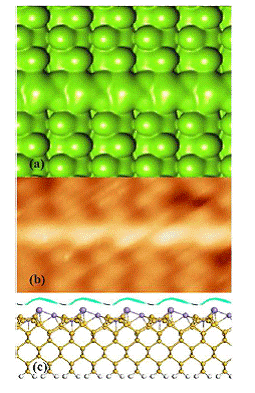Peking University, Nov. 12, 2010: Semiconductor silicon (Si) is universally acknowledged as the foundation of modern information technologies and industries. And its surface reconstruction and the self-assembly on adatoms are always capturing much attention of physicists. Compared with the systematic study on surface reconstruction of clean Si, more interests these years have been attracted to how its superficial atoms gather together spontaneously.
Prof. Wang Enge from International Center for Quantum Materials (ICQM) in School of Physics, Peking University (PKU), along with his colleagues, unveiled an atomistic nucleation process of monoatomic Mn nanowire self-assembly on Si (001). This team consisted of researchers from all over the world, including those working at Institute of Physics of the Chinese Academy of Sciences (CAS), University of Nevada in the US, and Northeast University in Japan. Their achievement was published in the Sept. 8 issue of an American Journal Physical Review Letters, with the title "Magic Monatomic Linear Chains for Mn Nanowire Self-Assembly on Si (001)."
During the research, the team confirmed a kind of linear chains composed of magic monatomic Mn atom groups on Si, which was one of their significant results. To account for the special structure, they observed nanowires with the magic number “3n+1” of Mn atoms - because of the induced strain along the wire stretching direction, two Mn adatoms over the surface trough showed a “buckled dimerlike” configuration with stress relief, while another on Si was pushed down into the atom substrate.
The discovery might be regarded as the theoretical basis to fabricate magnetic nano structures on semiconductor Si. Additionally, it will help understand reconstructions on Si surface and the related physical properties scientifically.

Figure: (a) Simulated scanning tunneling microscopy (STM) images of Mn wire on Si (001). (b) Experimental STM images (which has been matched up to the STM cross section, hereinafter the same). (c) Side view of STM images and atomic structure.
Background Info:
The International Center for Quantum Materials (ICQM), a teaching and research institute of PKU School of Physics, was established on Jan. 1, 2010. Following the advantages of PKU’s solid academic foundation and multidisciplinary interactions, it has built an open research platform for condensed matter physics, material physics, and other areas. At present, this newly founded institute is devoted to bringing in internationally renowned scientists as well as excellent young scholars, and creating an ideal atmosphere for their productive cooperation.
Prof. Wang Enge, Member of CAS, has worked in PKU since 2009 as Dean of School of Physics and of Graduate School. He graduated in theoretical physics from Liaoning University (1982) and obtained his PhD in condensed matter physics from Peking University (1990). Later, he continued his academic career in 1995 as a professor at CAS Institute of Physics, and soon took charge of it.
He had abundant overseas experiences — respectively as an exchanging student, a postdoctoral fellow, and a research scientist at Princeton University, Institut d’Electronique, de Microelectronique, et de Nanotechnologie of France, and the University of Houston.
Prof. Wang studies surface physics, whose approach is a combination of atomistic simulation of non-equilibrium growth and chemical vapor deposition of light-element nanomaterials. Recently, he also carries out researches on water behaviors in confinement.
Apart from his research work in PKU, Prof. Wang serves for the physics community in many committees, especially as vice chair of the International Union of Pure and Applied Physics (IUPAP-C10). Also, he is editor or member of editorial board for several international journals, such as Solid State Communication, IEEE Transactions on Nanotechnology, and Journal of Computational and Theoretical Nanoscience.
Translated by: Jin Ludi
Edited by: Jacques
Source: PKU News (Chinese)